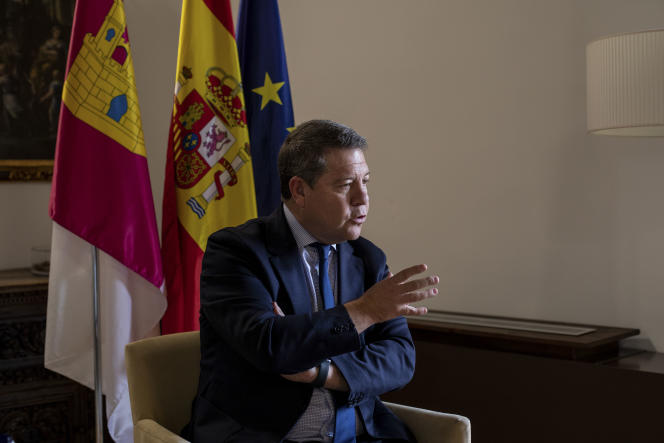In the Mudéjar palace of Fuensalida, in Toledo, the president of the autonomous community of Castile-La Mancha, Emiliano Garcia-Page, likes to say that it was here that the last meeting took place between Felipe Gonzalez, then head of the Spanish government , and François Mitterrand, in 1993. “There was a painting of the battle of Pavia on the wall, one of the few that the Spaniards won over the French, and it had to be removed…”, he laughs. Beyond the anecdote, he does not hide the nostalgia inspired in him by these left-wing figures from another time. He set himself up as the main detractor of the socialist leader of the Spanish government, Pedro Sanchez.
This 54-year-old politician, who has governed Castile-La Mancha since 2015, after having been mayor of Toledo, did not deign to go to the federal committee of the Spanish Socialist Workers’ Party (PSOE), which met in Madrid , Saturday, June 10, to ratify the composition of the lists of candidates for the early legislative elections of July 23. Neither him nor the president of Aragon, Javier Lamban. Both have thus chosen to signify their discomfort after the alterations made by the party leadership to the lists drawn up locally. About fifteen candidates also left these lists to protest against the choices of the management. In this context, and with the PSOE losing most of its territorial power in the May 28 local elections, many wonder where activists will still find the energy to campaign.
“Tribal Showdown”
If the results of the PSOE – 24% on May 28 – make many of their European counterparts green with envy, in Spain the party is in the grip of significant internal tensions. “The last few years have been very harsh politically: the levels of confrontation have exceeded the limits by far. We have a country divided in two, while a large majority of people do not want this division”, believes Mr. Garcia-Page. According to the regional president, the “extreme” have reduced politics to a “tribal clash” and Pedro Sanchez abandoned the center and compromised the historical values of the PSOE, leaving too much power to his cumbersome allies. On its left, Unidas Podemos is accused of questioning the 1978 Constitution, and the Catalan and Basque separatists are seen as a threat to the unity of Spain.
His opinion is shared by other socialists, but none has expressed it so clearly. However, his strategy paid off at the polls: Emiliano Garcia-Page is the only socialist baron to have retained his absolute majority. “People have not held me responsible for what they blame the president of the government for, because they have internalized the fundamental political differences between ushe said. Here we represent social democracy, the centre-left without bigotry, with very moderate attitudes that allow people who only agree 50% with what I say to vote for me. » He denies being the most right-wing of Spanish socialists and argues that he governs a very conservative region. “If I want to open public crèches, I have to go to three processions…”, he said ironically. According to him, in the current political climate, whoever wins “it is not the one with the most votes, but the one with the least veto”.
